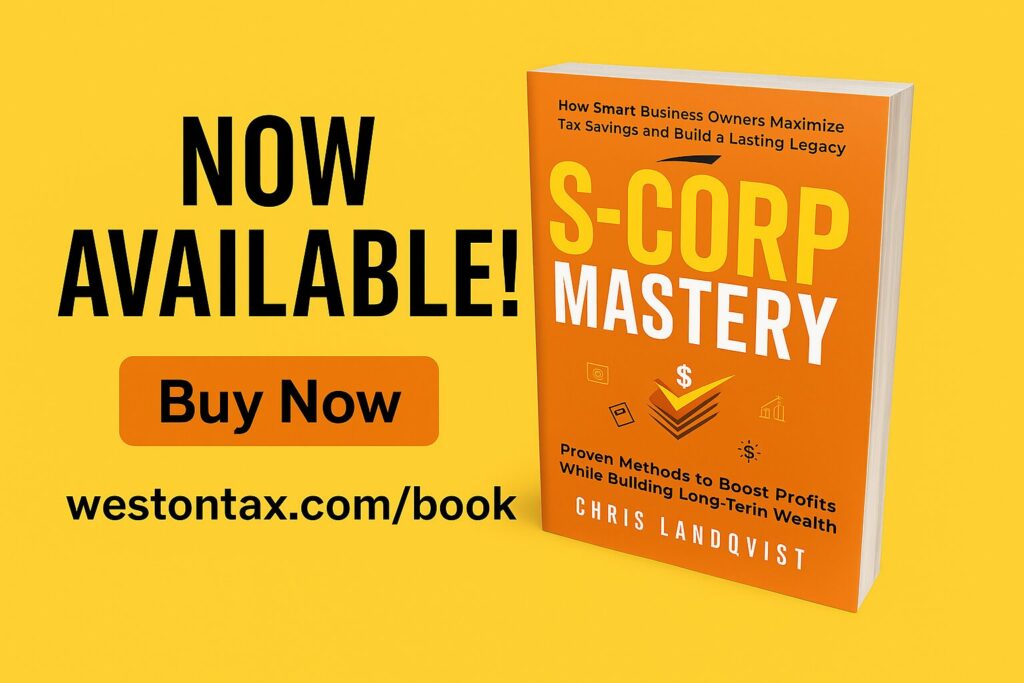Every year around this time, I get the same question from clients:
“Chris, why does tax compliance cost so much?”
And it’s a fair question. On the surface, compliance seems simple. You hand over your numbers, a few buttons are pushed, and the IRS gets their cut. But anyone who’s ever been through the process (and lived to tell the tale) knows that’s not the full story.
Tax compliance isn’t just about filing forms. It’s about protecting your business from financial landmines, staying ahead of federal and state rules that change faster than your favorite streaming lineup, and keeping your company off the IRS radar.
And if you’ve ever had to fix a tax mistake after the fact, you already know: compliance doesn’t seem expensive until you’ve experienced the cost of non-compliance.
Let’s talk about what you’re really paying for. And why, done right, tax compliance isn’t an expense at all. It’s insurance for your business’s longevity.
What Tax Compliance Really Means
When most people hear “tax compliance,” they think “filing taxes.” But real compliance is more like financial choreography. Every number must move in sync, following a complex rhythm of laws, deadlines, and documentation.
You’re not just filing a return. You’re maintaining an entire system: income tracking, payroll reconciliation, estimated payments, entity maintenance, and state reporting.
For a one-person business, that’s manageable. But once your business grows, adds employees, or operates across state lines, things start getting… interesting.
I once had a client, a construction company owner, tell me,
“I thought once I hit a million in revenue, life would get easier.”
I smiled and said,
“That’s when the IRS starts paying attention.”
Compliance isn’t about fear. It’s about readiness. It’s the quiet work behind the scenes that keeps your business from turning into an IRS case study.
The True Components of an Effective Tax Compliance Provider
If you’ve ever wondered what separates a good tax preparer from a true compliance professional, it comes down to one word: systems.
An effective compliance provider does more than just file. They protect. They anticipate. And they track every moving part of your financial life to make sure nothing slips through the cracks.
That includes understanding how your business structure affects your reporting. An LLC, S-Corp, or partnership each has different filing requirements, shareholder rules, and deadlines. Missing just one small compliance obligation — say, failing to file an S-Corp’s informational return — can trigger penalties even if no taxes are owed.
Good compliance is like good defense in football. You might not notice it when it’s working, but when it’s not, everyone feels it.
The Role of Software in Keeping Costs Down
Technology has changed the game — both for taxpayers and for the IRS.
Modern tax compliance software automates tasks that used to take hours: document uploads, signature tracking, real-time dashboards, and even AI-assisted reconciliation. At Weston Tax Associates, we’ve invested heavily in third party software to give clients a seamless experience.
But here’s the part most people don’t see: software doesn’t replace professionals. It empowers them. It’s the difference between a craftsman using a power tool versus a hand saw.
The right system cuts down on human error, speeds up turnaround time, and ensures your returns are filed securely and accurately. And when that software is integrated with strategic oversight, it becomes a competitive advantage — not just a convenience.
In short, software makes compliance more efficient. Expertise makes it bulletproof.
The Federal vs. State Compliance Juggle
Most business owners are shocked when they realize how different the compliance landscape looks once you operate in multiple states.
Federal compliance is the baseline — income tax, payroll, estimated payments. But states add their own layers: franchise taxes, gross receipts taxes, excise taxes, and filing fees. Each state has unique deadlines, forms, and calculation methods.
Take California, for example. Even if your S-Corp loses money, the state still charges an $800 franchise fee. In Tennessee, your “gross receipts” determine a business tax, regardless of profit. In Texas, you might owe franchise tax even if your entity is only registered there for a single contract.
Staying compliant across jurisdictions isn’t just tedious — it’s strategic. Understanding how states calculate tax liability helps you plan where and how to expand. And yes, sometimes the smartest move is to not expand into a particular state until your structure is optimized.
That’s the kind of insight you get when your compliance team is also your planning team.
The Shift Once You Hire Employees
If there’s a moment that changes everything for business owners, it’s when they hire their first employee.
Suddenly, you’re not just responsible for your own taxes — you’re responsible for theirs. That means payroll withholding, unemployment insurance, workers’ comp, and benefit reporting.
I had a client, a small marketing firm, that hired their first full-time designer. They handled payroll through a free online tool, thinking,
“How hard can it be?”
Well, they missed a state unemployment filing deadline. The penalty? Over $1,000 — for being late by less than two weeks.
Hiring employees changes your compliance footprint overnight. It’s no longer just about tax returns; it’s about systems that ensure accuracy, timeliness, and transparency. And once you start offering benefits or bonuses, compliance gets even more complex.
But here’s the upside: with the right planning, employees can also unlock tax benefits — from deductible wages to new retirement plan opportunities. It’s a bigger puzzle, but with a bigger payoff when done correctly.
Why “DIY” Compliance Usually Costs More
Let’s be honest… the internet makes everything look easy. There are countless apps and templates claiming to “simplify small business taxes.”
And while they work for side hustles or freelancers, once your business grows, DIY tax compliance starts to resemble home surgery.
One wrong click, one misclassified payment, or one missed deadline can trigger an IRS notice. But it can be much worse… it may trigger an audit. And when that happens, the cost of fixing it always exceeds what professional compliance would have cost in the first place.
Tax law isn’t static. It evolves constantly through legislation, court rulings, and IRS guidance. The only way to stay compliant and strategic is to work with professionals who live and breathe this stuff daily.
As I often say to clients, “The IRS changes its playbook. I read it for a living.”
The Cost of Staying Current
As we’re on this subject, it’s worth remembering that the IRS is anything but predictable. Their focus and enforcement priorities can shift overnight, often without much warning.
The only way professionals like me can stay ahead is to constantly track these changes and understand how they affect real taxpayers. That’s why I spend a good chunk of my time fighting for clients during IRS representation.
That firsthand experience gives me an edge — not just in compliance, but in tax planning. I see how the rules are applied in the real world, which helps my clients stay two steps ahead of whatever new “crackdown” the IRS dreams up next.
So while compliance costs can look high on paper, what you’re really paying for is peace of mind. And access to someone who knows where the landmines are buried.
Compliance Isn’t a Cost — It’s Leverage
Here’s the mindset shift: compliance isn’t something you do for the IRS. It’s something you do for yourself.
Strong compliance doesn’t just keep you out of trouble — it positions you for better financing, smoother audits, and cleaner exits if you ever sell your company. Lenders, investors, and buyers all love one thing: organized financials and transparent tax records.
That’s why compliance is a cornerstone of wealth building. The more accurate and timely your filings are, the more flexibility you have when opportunities arise.
I tell clients all the time: “Good compliance makes great strategy possible.” You can’t build wealth on messy books.
The Real Value of Compliance Expertise
So, what are you actually paying for when you invest in professional tax compliance?
- You’re paying for expertise, foresight, and protection.
- You’re paying for someone who knows how to interpret new laws, navigate gray areas, and defend your position if questioned.
- You’re paying for efficiency — the kind that keeps your filings accurate, your deadlines met, and your stress level down.
And most importantly, you’re paying for time. Time to focus on running your business instead of worrying about whether the IRS is going to send you a love letter in March. That’s the real return on investment.
If you feel that you need someone in your corner that can handle your every tax need… feel free to reach out and I will have you sorted immediately.
Welcome to the New Age of Accounting. Let’s begin.
P.S. If you found this article helpful, you’ll love my new book S-Corp Mastery: How Smart Business Owners Maximize Tax Savings & Build a Lasting Legacy. It’s now live and available in a sleek, easy-to-read PDF version. Grab your copy here.

Chris is the Managing Partner at Weston Tax Associates, a best-selling author, and a renowned tax strategist. With over 20 years of expertise in tax and corporate finance, he simplifies complex tax concepts into actionable strategies that drive business growth. Originally from Sweden, he now lives in Florida with his wife and two sons.










